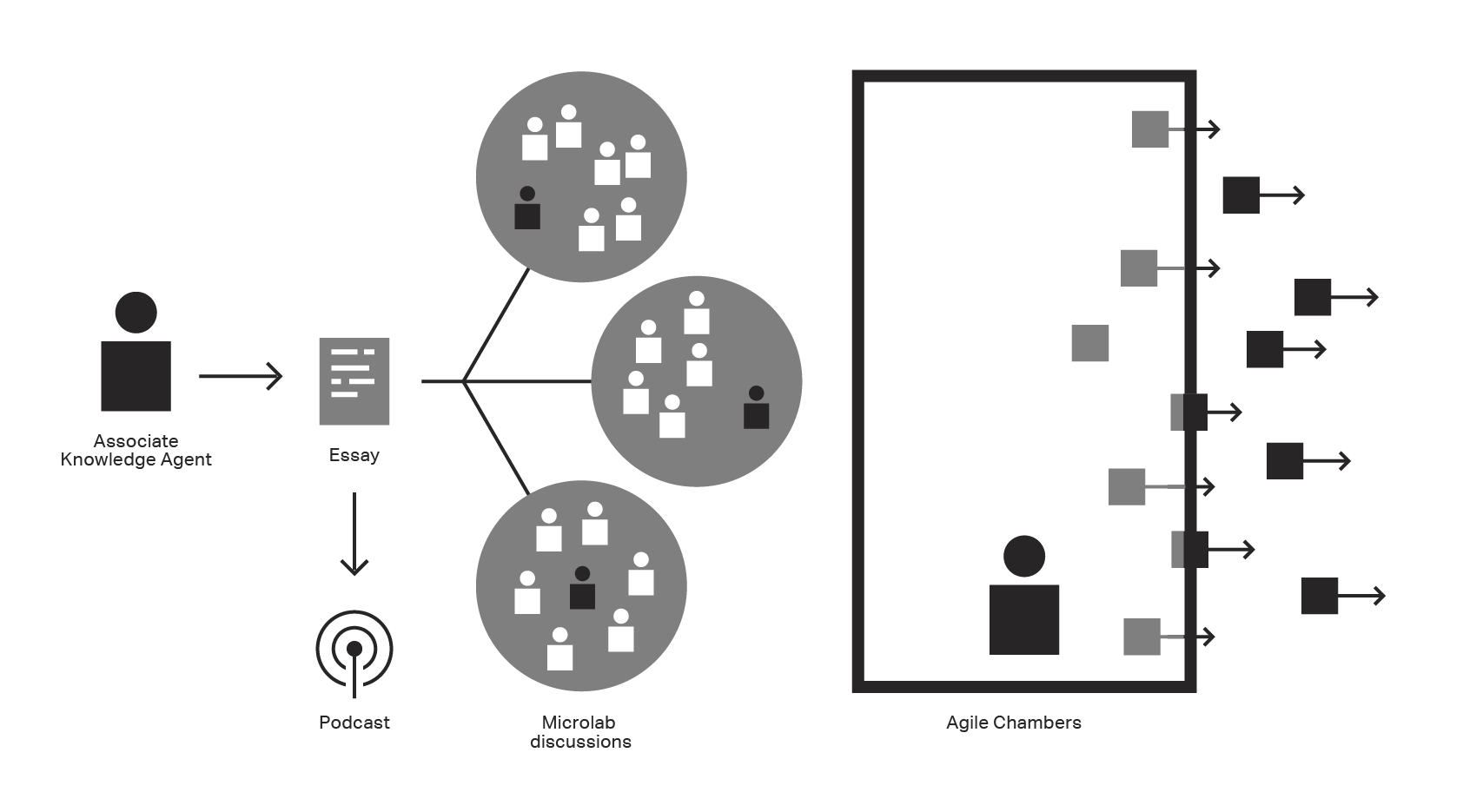What is a Microlab?
It’s a coming together around a project or initiative to workshop, research and develop, to test, prototype, discuss and direct future activities. It is more than a workshop: broader in ambition than a sprint and less arduous than an incubator. A Microlab is a perfect event structure to advance creative projects, enable organisations and enhance and harness value.
Why host a Microlab?
Microlabs (interdisciplinary workshops) enable creative organisations to access new knowledge, skills and expertise, and build interdisciplinary networks. They bring together participants from diverse disciplines, sectors or practices to investigate questions, themes or issues confronting creative arts organisations. There is no prescribed formula for a Microlab, with the structure evolving in response to specific project needs and participants.
Who to involve: developing a project brains trust
Invite 2-3 people external to your organisation, from beyond your daily networks, and let them be part of your project. Accommodate, feed and pay them, and enable these guest knowledge agents to infect and push your projects in new directions during the Microlab and beyond.
Fill the room with people associated with your project, its core delivery team, or others that contribute to its outcomes (think contract creative staff or potential collaborators). It helps if in the room there are individuals with project management and communication skills and experience to run the Microlab, direct conversation, and articulate and reflect on proceedings. The key requirement for the group is an open-minded willingness to engage, be mentally flexible and self-reflexive, in a process of exchanging ideas and knowledge.
Venue
Find a venue that enables 8-12 people to be part of the Microlab. Think large meeting space or room with trappings that enable people to think differently and outside of their day-to-day roles. Make sure there are large tables around which discussions or other activities can take place (drawing, mapping, word-play).
Other resources
Bring equipment to record the sessions and capture those crucial moments of insights simply with audio recorders (Zooms). Bring sheets of paper (so people can map things), white boards, post-it notes (of course), large digital screens or projectors and a sound system so that any material can be see and heard. Consider broadcasting part of the Microlab—turn it outwards—to enable an external audience to connect with the ideas (e.g., Periscopic, Facebook live).
Planning timeline
- 3 months prior: Start inviting key guests and block in their calendars
- 1-2 months prior: Secure location for Microlab
- 2 weeks prior: Shape up timing of Microlab sessions and who’s presenting, when discussion is, site visits, times for reflection etc.
- 1 week prior: Iterate over time table, remove any unsolved items, and simple timing. Remember to allow for unstructured time within the days, so adhoc conversations or activities can emerge.
- Week of: Email participants with Microlab structure
Activities
Structure main days of Microlab as 1 ½ days of guided activity for the participants. The second day (shorter of the two) is primarily about reflection and direction setting. So plan the first day as the one that gets everyone up to speed.
Imagine, envisage and create diverse activities, such as:
- Vision Sessions: Invite the CEO or the project leader to outline their vision for what is to be achieved, now and into the future. Let a future landscape be presented, and then let people respond to this vision.
- Customer Journey Mapping (aka learning from Service Design): Understand your creative project through the lens of its audience. Use service design tools and direct a session that maps out a Journey Map for your audience, or a diagram of your organisation’s stakeholders
- Project Research and Development: Focus on exploring a project that is in development. Run a rehearsal, practice or test workshop—as a process of practical development—and enable external participants to witness and be part of this milieu.
- Guest Participant Presentations: Invite your knowledge agents to present their work and ways of thinking in reaction to your organisation, the project, or an idea that might resonate with the team. (Structure guide: 30-40 minute presentation by guest, followed by 1 hour structured discussion guided by key researchers. Welcome everyone to contribute.)
- External Guest Presenters: Occasionally invite someone completely external to your way of being (think economist) to come in for an hour to put a unique lens on the project, to polarise opinions. Then use these discordant themes to discuss harmony within the project or trajectories for ideas (Structure guide: 1 hour with guest, followed by .5 hour discussion.)
- Public Event: Organise a public panel, screening, performance, and enable the group to discuss the Microlab activities with a wider audience (Structure guide: 2 hours at lunch or night time)
Microlabs: Guiding principles
The Agile Opera Project proposes five guiding principles to draw upon when hosting a Microlab:
- Participants as knowledge agents: Microlabs require the recruitment of participants from a wide field of disciplines and permits their flexible participation.
- Prioritisation of process over closure: Microlabs should prioritise the co-creation of new forms of knowledge over the creation of outputs or products.
- Privileging of space for speculation and reflection: Microlabs should be supportive, flexible and responsive to enable ideas and tentative propositions to be ‘floated’ within a space of dialogic encounter. Space for ‘thinking’ should be permitted for collective and individual self-reflexive thought and social interaction.
- Expanded repertoire of collaborative activities: Microlabs should draw on an expanded repertoire of activities, including discussion, creative play, mapping exercises, reflection and interaction.
- Co-creation of knowledge: Microlabs should be supportive, flexible and responsive, enabling participants to collectively contribute to determining processes and activities involved in the co-creation of knowledge.
Photo credit: Pier Carthew

